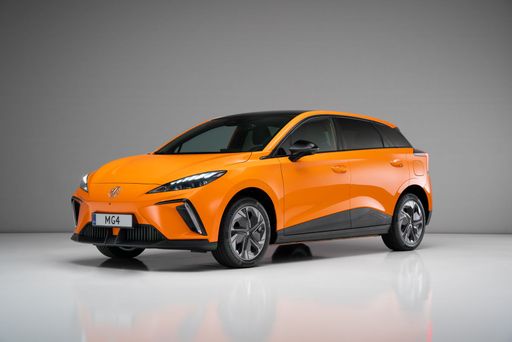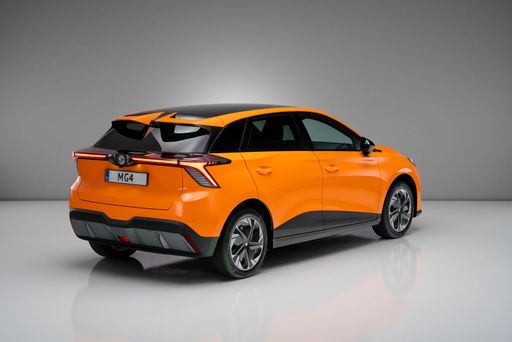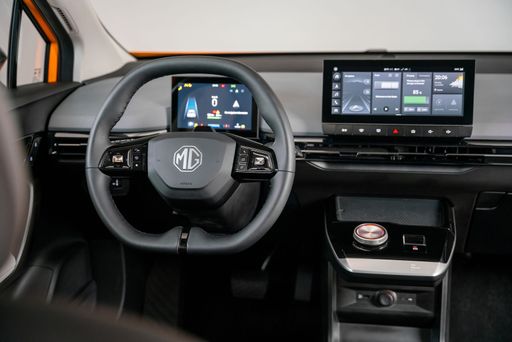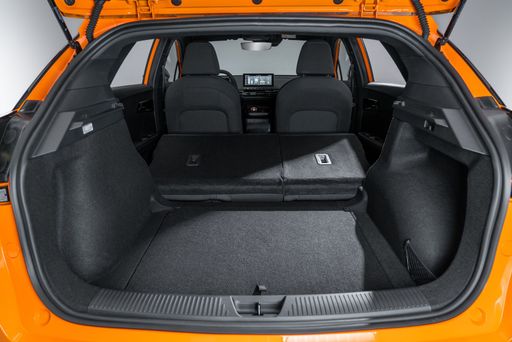MG MG4 vs Toyota C-HR – Which one offers the better deal?
Everyday use, family trips or long-distance drives – here’s where the differences show.
Discover whether MG MG4 or Toyota C-HR fits your lifestyle better.
Costs and Efficiency:
Price and efficiency are key factors when choosing a car – and this is often where the real differences emerge.
Toyota C-HR has a minimal advantage in terms of price – it starts at 29100 £, while the MG MG4 costs 30500 £. That’s a price difference of around 1414 £.
As for range, the MG MG4 performs convincingly better – achieving up to 450 km, about 382 km more than the Toyota C-HR.
Engine and Performance:
Under the bonnet, it becomes clear which model is tuned for sportiness and which one takes the lead when you hit the accelerator.
When it comes to engine power, the Toyota C-HR has a hardly perceptible edge – offering 223 HP compared to 204 HP. That’s roughly 19 HP more horsepower.
In acceleration from 0 to 100 km/h, the MG MG4 is hardly perceptible quicker – completing the sprint in 7.10 s, while the Toyota C-HR takes 7.40 s. That’s about 0.30 s faster.
In terms of top speed, the Toyota C-HR performs slightly better – reaching 180 km/h, while the MG MG4 tops out at 160 km/h. The difference is around 20 km/h.
Space and Everyday Use:
Beyond pure performance, interior space and usability matter most in daily life. This is where you see which car is more practical and versatile.
Both vehicles offer seating for 5 people.
In curb weight, Toyota C-HR is slight lighter – 1505 kg compared to 1635 kg. The difference is around 130 kg.
In terms of boot space, the Toyota C-HR offers a bit more room – 447 L compared to 363 L. That’s a difference of about 84 L.
In maximum load capacity, the MG MG4 performs clearly perceptible better – up to 1765 L, which is about 610 L more than the Toyota C-HR.
When it comes to payload, MG MG4 hardly perceptible takes the win – 449 kg compared to 425 kg. That’s a difference of about 24 kg.
Who wins the race?
The MG MG4 proves to be wins the duel decisively and therefore becomes our DriveDuel Champion!
MG MG4 is the better all-rounder in this comparison.
 @ MG Motor / SAIC Motor Corporation
@ MG Motor / SAIC Motor Corporation
MG MG4
MG MG4
The MG4 is a sprightly electric hatch that marries bold, modern looks with genuinely useful practicality, making it a great everyday companion for city and weekend life alike. Inside it surprises with a smart, user-friendly cabin and an engaging drive that delivers more personality than you might expect for the price.
details @ MG Motor / SAIC Motor Corporation
@ MG Motor / SAIC Motor Corporation
 @ MG Motor / SAIC Motor Corporation
@ MG Motor / SAIC Motor Corporation
 @ MG Motor / SAIC Motor Corporation
@ MG Motor / SAIC Motor Corporation
 @ MG Motor / SAIC Motor Corporation
@ MG Motor / SAIC Motor Corporation
Toyota C-HR
The Toyota C-HR cuts a striking figure with its angular styling and coupe-like profile, so you’ll never go unnoticed in the supermarket car park. It balances everyday practicality with a nimble, city-friendly personality, making routine commutes feel a touch more fun without asking for forgiveness.
details @ Toyota Motor Corporation
@ Toyota Motor Corporation
 @ Toyota Motor Corporation
@ Toyota Motor Corporation
 @ Toyota Motor Corporation
@ Toyota Motor Corporation
 @ Toyota Motor Corporation
@ Toyota Motor Corporation
 @ Toyota Motor Corporation
@ Toyota Motor Corporation
 @ MG Motor / SAIC Motor Corporation
@ MG Motor / SAIC Motor Corporation
|
 @ Toyota Motor Corporation
@ Toyota Motor Corporation
|
|
|
|
Costs and Consumption |
|
|---|---|
|
Price
30500 - 36500 £
|
Price
29100 - 42800 £
|
|
Consumption L/100km
-
|
Consumption L/100km
0.8 - 5.1 L
|
|
Consumption kWh/100km
16.4 - 17 kWh
|
Consumption kWh/100km
-
|
|
Electric Range
330 - 450 km
|
Electric Range
68 km
|
|
Battery Capacity
49 - 61.7 kWh
|
Battery Capacity
-
|
|
co2
0 g/km
|
co2
17 - 115 g/km
|
|
Fuel tank capacity
-
|
Fuel tank capacity
43 L
|
Dimensions and Body |
|
|---|---|
|
Body Type
Hatchback
|
Body Type
SUV
|
|
Seats
5
|
Seats
5
|
|
Doors
5
|
Doors
5
|
|
Curb weight
1635 - 1695 kg
|
Curb weight
1505 - 1755 kg
|
|
Trunk capacity
350 - 363 L
|
Trunk capacity
350 - 447 L
|
|
Length
4287 mm
|
Length
4362 mm
|
|
Width
1836 mm
|
Width
1832 mm
|
|
Height
1504 - 1516 mm
|
Height
1558 - 1564 mm
|
|
Max trunk capacity
1165 - 1765 L
|
Max trunk capacity
1076 - 1155 L
|
|
Payload
389 - 449 kg
|
Payload
375 - 425 kg
|
Engine and Performance |
|
|---|---|
|
Engine Type
Electric
|
Engine Type
Full Hybrid, Plugin Hybrid
|
|
Transmission
Automatic
|
Transmission
Automatic
|
|
Transmission Detail
Reduction Gearbox
|
Transmission Detail
CVT
|
|
Drive Type
Rear-Wheel Drive
|
Drive Type
Front-Wheel Drive, All-Wheel Drive
|
|
Power HP
170 - 204 HP
|
Power HP
140 - 223 HP
|
|
Acceleration 0-100km/h
7.1 - 7.6 s
|
Acceleration 0-100km/h
7.4 - 9.9 s
|
|
Max Speed
160 km/h
|
Max Speed
175 - 180 km/h
|
|
Torque
250 Nm
|
Torque
-
|
|
Number of Cylinders
-
|
Number of Cylinders
4
|
|
Power kW
125 - 150 kW
|
Power kW
103 - 164 kW
|
|
Engine capacity
-
|
Engine capacity
1798 - 1987 cm3
|
General |
|
|---|---|
|
Model Year
2025
|
Model Year
2024 - 2025
|
|
CO2 Efficiency Class
A
|
CO2 Efficiency Class
C, B
|
|
Brand
MG
|
Brand
Toyota
|
What drivetrain options does the MG MG4 have?
The MG MG4 is available as Rear-Wheel Drive.
The prices and data displayed are estimates based on German list prices and may vary by country. This information is not legally binding.
